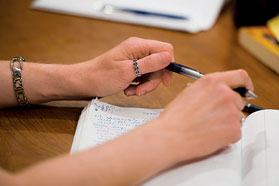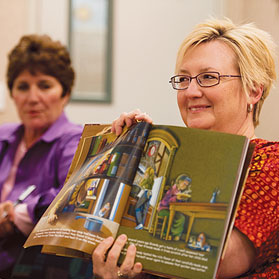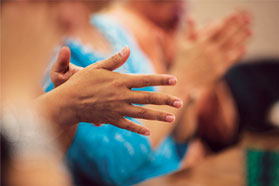Outreach: Healing words
 That something to which Greer is referring is cancer, and she is determined to prevent it from defining or breaking her.
That something to which Greer is referring is cancer, and she is determined to prevent it from defining or breaking her.
So every week, Greer and about eight other people affected by the disease meet at UC Davis Cancer Center. They gather not for chemotherapy, radiation or any other medical treatment related to cancer. They gather to write. And as they write, they heal.
"We show up at the table as writers. Our role as patient, survivor or caretaker is irrelevant. We are all there to express something," says Terri Wolf, a radiation oncology nurse at the cancer center and one of two volunteer group facilitators.
"People open their hearts and spill their emotions on the page, and there is a sense that we’re all one .... We are sharing at the deepest level," adds Christine Holmstrom, a writing group member who is a cancer survivor.
 "We show up at the table as writers. Our role as patient, survivor or caretaker is irrelevant. We are all there to express something."
"We show up at the table as writers. Our role as patient, survivor or caretaker is irrelevant. We are all there to express something."
During the past six years, UC Davis Cancer Center has offered writing groups for people affected by cancer. Called Writing as Healing, the groups allow people a safe environment to write whatever they are feeling as they grapple with cancer in some form in their lives.
The writing groups are modeled after the Amherst Writers and Artists method, which embraces a free-form approach to writing. The method asks writers to respond to various prompts and write in a stream-of-consciousness style for a set period of time. The prompts may be a poem, a picture, a postcard, a line from a book – anything.
"You want to be evocative somehow, to tap into something that may already be wanting to be written," says Sarah Wenstrand, another writing-group facilitator. "It’s very freeing."
The idea behind the method is to unlock whatever is lying within the writer that needs to get out. Sometimes it is anger at the disease. Sometimes it is fear. It may be a random memory from childhood that surfaces, seemingly of its own accord.
"Sometimes we write about cancer. Sometimes we don’t," says Rhoda McKnight, a member of the writing group. "It gives you the opportunity, if you hang in there, to let all of your guard down and say whatever it is that needs to be said."
McKnight, 70, a retired director of communications for the UC Davis College of Agricultural and Environmental Sciences, says she has written throughout her professional life, but was reluctant to join the writing group.
"I thought the last thing I wanted to do was sit in a room and write about cancer," she says. "Cancer had been my whole life for the past year."
But McKnight says she had never before written from the depths of her soul, as she says she and others in the writing group do now.
"Cancer is a physical thing, but the other portion is psychological," she says. "You can’t be the same person after doing this kind of work."
"Some of the things we thought were god-awful and painful turn out to be kind of quirky and funny, too."
Beverly Williams, 69, says her writing within the group gave her courage to marry her husband, John Williams, 69. Both are cancer survivors. She says she felt empowered through the whole writing process.
"It’s important to have the courage to live your life," says Beverly. "Do not live in fear of what the next disaster will bring."
She adds that the writing has illustrated for her that humor can be found even in difficulty.
"Some of the things we thought were god-awful and painful turn out to be kind of quirky and funny, too," she says.
Beverly Williams’ most recent cancer recurrence is in her mouth. She recently underwent surgery in which bone from her leg replaced her lower jawbone, and leg tissue replaced tissue that had been removed from her mouth.
 "Sometimes we write about cancer. Sometimes we don’t. It gives you the opportunity, if you hang in there, to let all of your guard down and say whatever it is that needs to be said."
"Sometimes we write about cancer. Sometimes we don’t. It gives you the opportunity, if you hang in there, to let all of your guard down and say whatever it is that needs to be said."
"I’ve got my leg in my mouth," she jokes.
John Williams, who uses the pen name J. Maurice Williams, believes that writing releases endorphins that soothe the writer. A study of breast cancer survivors found sleep improved after participants took part in writing groups.
"A lot of the scars and bad experiences get released in some way through the writing," he says. Williams adds that he thinks the writing discipline used in the groups is especially helpful to men, whom he believes are typically reluctant to express emotion.
"All I can say to men is you are missing something so valuable to yourself," he says.
The Writing as Healing groups are designed to create a sense of safety. Writers may choose to read their writing aloud – or not. Other writers are asked not to criticize the reading, but rather to point out its strengths and emotions it evoked.
"It’s not really time to critique and edit and point out a run-on sentence," says Wenstrand. "We want to create a supportive community where everyone is recognized as a writer by the simple fact that they write."
Participants are told that the writing is to be viewed as fiction, not based on the writer’s life. The idea is that treating the work as fiction provides the writer more freedom in writing and separation for the story. It keeps the focus on the writing and prevents the gathering from becoming a support group.
"This is a writing group, not a support group," says Wenstrand. "We hear each other’s stories, but we are not accountable to try to fix each other."
Wenstrand started with a writing group in the weeks after her husband died following a 12-year battle with cancer.
"I really started writing as a brand-new widow," she says. She developed a regular routine of writing and eventually became trained in the Amherst method.
Wolf, the other facilitator, says people in the groups often are amazed at what appears on the page as they write. She, too, is stunned by the depth and beauty of the writing.
"It is truly amazing when you totally let your pen flow, and write whatever comes to your mind, that you get to the place you need to write about," says Wolf.







